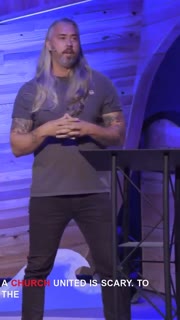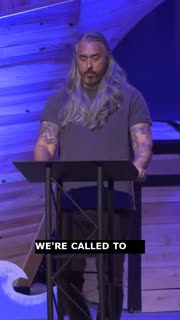Living Out Love: Unity in Diversity as Christians
Summary
### Summary
Today, we explored the concept of "Bumper Sticker Christianity," focusing on how our actions and attitudes as Christians can either attract or repel others from the faith. The sermon began with a humorous anecdote about bumper stickers and how they can convey strong political messages, which led to a deeper reflection on what our "bumper stickers"—our actions and words—say about us as followers of Christ. We delved into 1 Peter 3:8-17, which calls for unity, sympathy, brotherly love, a tender heart, and a humble mind. These virtues are essential for maintaining unity within the body of Christ, especially in a world that thrives on division.
Unity of mind does not mean uniformity; it means cooperation amidst diversity. We can have different opinions and methods but must unite under the Word of God. Sympathy involves taking others' hurts into our hearts, understanding their perspectives, and seeking common ground. Brotherly love goes beyond mere tolerance; it involves deep, sacrificial love that sometimes requires correction and protection. A tender heart believes the best in others, celebrating their progress rather than judging their shortcomings. Finally, a humble mind is crucial for achieving all these virtues. It requires us to admit our faults and approach conflicts with the possibility that we could be wrong.
The sermon concluded with a call to action: to reconcile broken relationships, whether with God or with others, and to strive for unity that reflects the love of Christ to the world. The world will know we are Christ's disciples by our love for one another, not by our political affiliations or denominational differences.
### Key Takeaways
1. Unity of Mind: Unity in the body of Christ does not mean everyone must think the same way. It means we cooperate amidst our diversity, uniting under the Word of God. Different methodologies and backgrounds can coexist as long as we aim to reach people for Christ. This unity is powerful and glorifies God when we work together harmoniously. [12:40]
2. Sympathy: True sympathy involves taking others' hurts into our hearts. It requires us to understand their perspectives and seek common ground. This can be challenging but is essential for resolving conflicts and building stronger relationships within the church. Asking questions like "What do you mean by that?" can help clarify misunderstandings and foster deeper connections. [23:04]
3. Brotherly Love: Brotherly love goes beyond mere tolerance; it involves a deep, sacrificial love that sometimes requires correction and protection. This love is rooted in our shared identity as children of God and calls us to act in the best interest of our brothers and sisters, even when it is difficult. [31:26]
4. Tender Heart: A tender heart believes the best in others and celebrates their progress rather than judging their shortcomings. This attitude fosters a culture of grace and encouragement, helping everyone grow in their faith journey. It requires us to look beyond surface-level behaviors and understand the deeper stories of transformation. [34:51]
5. Humble Mind: A humble mind is crucial for achieving unity, sympathy, brotherly love, and a tender heart. It requires us to admit our faults and approach conflicts with the possibility that we could be wrong. This humility allows us to reconcile with others and maintain healthy, God-honoring relationships. [37:02]
### YouTube Chapters
[0:00] - Welcome
[02:57] - Introduction and Target Story
[03:38] - Bumper Stickers and First Impressions
[05:15] - Reflecting on Our Own "Bumper Stickers"
[06:51] - The Impact of Our Actions
[07:37] - The Challenge of Unity in a Divisive World
[08:47] - The Power of a United Church
[09:41] - Prayer and Scripture Reading
[10:31] - Unity of Mind
[12:40] - Unity is Not Uniformity
[13:16] - Cooperation in Diversity
[14:57] - The Power of a Choir
[16:28] - Theology and Unity
[18:10] - The Importance of Correcting in Love
[18:58] - The Story of Paul and Barnabas
[20:38] - Reconciliation and Covering More Ground
[22:17] - Don't Turn Detours into Exits
[23:04] - Sympathy: Taking Others' Hurt into Your Heart
[24:28] - A Personal Story of Misunderstanding
[26:30] - Seeking Common Ground
[27:24] - Clarifying Misunderstandings
[28:36] - Avoiding Straw Man Arguments
[29:56] - Brotherly Love: Beyond Tolerance
[31:26] - A Childhood Story of Retaliation
[33:51] - The Depth of Brotherly Love
[34:51] - Tender Heart: Believing the Best in Others
[36:16] - Celebrating Small Wins
[37:02] - Humble Mind: Admitting Faults
[38:05] - The Difficulty of Saying Sorry
[39:22] - Removing the Log from Your Own Eye
[40:07] - The Possibility of Being Wrong
[41:23] - Peacemakers, Not Peacekeepers
[42:20] - The World Will Know Us by Our Love
[43:15] - Recap of the Five Virtues
[44:45] - A Personal Story of Family Love
[45:35] - Christ's Example of Unity and Sacrifice
[46:03] - Prayer for Reconciliation
[47:14] - Prayer for Forgiveness and Unity
[48:28] - Invitation to Reconcile and Pray
[48:59] - Closing Remarks and Final Song
Study Guide
### Bible Reading
1 Peter 3:8-17 (ESV)
> Finally, all of you, have unity of mind, sympathy, brotherly love, a tender heart, and a humble mind. Do not repay evil for evil or reviling for reviling, but on the contrary, bless, for to this you were called, that you may obtain a blessing. For “Whoever desires to love life and see good days, let him keep his tongue from evil and his lips from speaking deceit; let him turn away from evil and do good; let him seek peace and pursue it. For the eyes of the Lord are on the righteous, and his ears are open to their prayer. But the face of the Lord is against those who do evil.” Now who is there to harm you if you are zealous for what is good? But even if you should suffer for righteousness' sake, you will be blessed. Have no fear of them, nor be troubled, but in your hearts honor Christ the Lord as holy, always being prepared to make a defense to anyone who asks you for a reason for the hope that is in you; yet do it with gentleness and respect, having a good conscience, so that, when you are slandered, those who revile your good behavior in Christ may be put to shame. For it is better to suffer for doing good, if that should be God's will, than for doing evil.
### Observation Questions
1. What are the five virtues listed in 1 Peter 3:8 that Christians are called to embody?
2. According to the sermon, what does "unity of mind" mean, and how is it different from uniformity? [12:40]
3. How does the sermon describe the role of sympathy in resolving conflicts within the church? [23:04]
4. What example from the sermon illustrates the concept of brotherly love going beyond mere tolerance? [31:26]
### Interpretation Questions
1. How does the concept of "unity of mind" apply to the diverse opinions and backgrounds within a church community? [12:40]
2. Why is it important to take others' hurts into our hearts, as described in the sermon? How does this practice contribute to church unity? [23:04]
3. In what ways does a tender heart help in fostering a culture of grace and encouragement within the church? [34:51]
4. How does having a humble mind enable Christians to reconcile with others and maintain healthy relationships? [37:02]
### Application Questions
1. Reflect on your own "bumper stickers"—your actions and words. What do they say about you as a follower of Christ? How can you ensure they attract rather than repel others? [05:15]
2. Think of a recent conflict you had within the church or with a fellow believer. How could you have approached it with more sympathy and understanding? [23:04]
3. Identify a relationship in your life that needs reconciliation. What steps can you take this week to begin mending that relationship? [46:03]
4. How can you practice brotherly love in a way that goes beyond mere tolerance and involves deep, sacrificial love? [31:26]
5. Consider someone in your church community who is struggling. How can you show them a tender heart by celebrating their progress rather than judging their shortcomings? [34:51]
6. Reflect on a time when you had to admit you were wrong. How did humility play a role in resolving the conflict? How can you cultivate a humble mind in future disagreements? [37:02]
7. How can you actively work towards unity in your church, especially in a world that thrives on division? What practical steps can you take to foster a more united church community? [08:47]
Devotional
Day 1: Unity in Diversity
Unity in the body of Christ does not mean everyone must think the same way. It means we cooperate amidst our diversity, uniting under the Word of God. Different methodologies and backgrounds can coexist as long as we aim to reach people for Christ. This unity is powerful and glorifies God when we work together harmoniously. Unity of mind does not mean uniformity; it means cooperation amidst diversity. We can have different opinions and methods but must unite under the Word of God. [12:40]
1 Corinthians 12:12-14 (ESV): "For just as the body is one and has many members, and all the members of the body, though many, are one body, so it is with Christ. For in one Spirit we were all baptized into one body—Jews or Greeks, slaves or free—and all were made to drink of one Spirit. For the body does not consist of one member but of many."
Reflection: Think of a situation where you disagreed with someone in your church. How can you find common ground and work together for the glory of God?
Day 2: True Sympathy
True sympathy involves taking others' hurts into our hearts. It requires us to understand their perspectives and seek common ground. This can be challenging but is essential for resolving conflicts and building stronger relationships within the church. Asking questions like "What do you mean by that?" can help clarify misunderstandings and foster deeper connections. Sympathy involves taking others' hurts into our hearts, understanding their perspectives, and seeking common ground. [23:04]
Romans 12:15-16 (ESV): "Rejoice with those who rejoice, weep with those who weep. Live in harmony with one another. Do not be haughty, but associate with the lowly. Never be wise in your own sight."
Reflection: Think of someone who is going through a difficult time. How can you show genuine sympathy and support to them today?
Day 3: Brotherly Love Beyond Tolerance
Brotherly love goes beyond mere tolerance; it involves a deep, sacrificial love that sometimes requires correction and protection. This love is rooted in our shared identity as children of God and calls us to act in the best interest of our brothers and sisters, even when it is difficult. Brotherly love goes beyond mere tolerance; it involves deep, sacrificial love that sometimes requires correction and protection. [31:26]
1 John 3:16-18 (ESV): "By this we know love, that he laid down his life for us, and we ought to lay down our lives for the brothers. But if anyone has the world's goods and sees his brother in need, yet closes his heart against him, how does God's love abide in him? Little children, let us not love in word or talk but in deed and in truth."
Reflection: Is there someone in your church family who needs correction or protection? How can you lovingly address this need?
Day 4: A Tender Heart
A tender heart believes the best in others and celebrates their progress rather than judging their shortcomings. This attitude fosters a culture of grace and encouragement, helping everyone grow in their faith journey. It requires us to look beyond surface-level behaviors and understand the deeper stories of transformation. A tender heart believes the best in others, celebrating their progress rather than judging their shortcomings. [34:51]
Ephesians 4:32 (ESV): "Be kind to one another, tenderhearted, forgiving one another, as God in Christ forgave you."
Reflection: Think of someone you have judged harshly. How can you change your perspective to celebrate their progress instead?
Day 5: Humility in Conflict
A humble mind is crucial for achieving unity, sympathy, brotherly love, and a tender heart. It requires us to admit our faults and approach conflicts with the possibility that we could be wrong. This humility allows us to reconcile with others and maintain healthy, God-honoring relationships. A humble mind is crucial for achieving unity, sympathy, brotherly love, and a tender heart. [37:02]
Philippians 2:3-4 (ESV): "Do nothing from selfish ambition or conceit, but in humility count others more significant than yourselves. Let each of you look not only to his own interests, but also to the interests of others."
Reflection: Reflect on a recent conflict you had. How can you approach it with humility and seek reconciliation?
Quotes
### Quotes for Outreach
1. "If my life was a car, DeLorean, and I'm driving down the road. And I'm saying to people, follow me. I know the way. I know the way to go. Get behind me. Hop in. But all the ways I treated my friends, all the ways I treated my family were displayed as bumper stickers. Would the people around me want to follow me? Because honestly, that's what we're saying as Christians. We're saying that we know the way. We know the way to salvation. We've been there before. We've met Jesus. I can show you. Hop in. Follow me. But does the way I treat others actually reflect that?" [05:51] (44 seconds)
2. "A church united is scary. To the darkness. We use anything. We only use a piece of fabric on your face to decide whether you're going to attend a church or leave the body of Christ. That's what that little piece of fabric had the power to do. It was amazing to watch. And sad. Really sad. So, how then do we have unity within the body of Christ? Is it even possible?" [08:47] (30 seconds)
3. "The job we're trying to get done is to reach people for Christ. It's pretty simple. Reach people with the gospel. Romans 15.5 says this. May the God of endurance and encouragement grant you to live in such harmony with one another in accord with Jesus Christ that together you may with one voice glorify God, the Father of our Lord Jesus Christ." [13:58] (21 seconds)
4. "The world will know us because of our love for one another. John 13, 35 says, By this, all will know that you are my disciples, if you have love for one another. How do we do this? We have unity of mind. We unite under the word of God. Number two, we have sympathy for each other. We take others' hurts, put them in our heart. Number three, we have brotherly love. Not the needle-rug kind, but the, I will do anything for you. Number four, we have a tender heart. We believe the best about each other. And number five, we have a humble mind. We approach things that maybe we could be wrong." [42:20] (49 seconds)
5. "Before we come into a relationship with Jesus, there is conflict. There is an outstanding debt. There is a broken relationship. Christ came in unity of purpose with the Father to live amongst us. He came with sympathy to sympathize with the human experience. To love us even though we were enemies to him. To humble himself. To take on the cross, be crucified, and pay the debt that we owed with his own blood. And to raise again three days later for our justification." [45:35] (32 seconds)
### Quotes for Members
1. "So what do I want my bumper stickers to say? We're going to talk about five things today. Number one, unity of mind. Number two, sympathy. Number three, brotherly love. Number four, tender heart. And number five, humble mind. As of April 2023, the Center for the Study of Global Christianity estimates that there are more than 45,000 Christian denominations worldwide. With over 200 in the United States. And these denominations can range in size from fewer than 100 to millions of members. In the church, it seems like we just might have a unity problem." [11:31] (52 seconds)
2. "Talking about the body of Christ here, what does unity of mind mean in the body of Christ? Well, I think a good definition is cooperation in the midst of diversity. The reason a giant choir, and there was a hundred and something of us, the reason a giant choir is so powerful is because all the different faces, all the different voices, all the different vocal ranges are all together and they're singing the same song. That's why a choir is so powerful. You ever seen a big choir just like blown away and like moved to tears? Like, what's happening to me? It's just because it's so powerful because underneath the robes and whatever is this unity." [16:28] (46 seconds)
3. "Don't turn someone's detour into an exit. Just because you and another believer see a situation differently, and you disagree and you go two different ways, that is not a reason to say, well, that person's not a Christian. It's a difference of opinion. It's a disagreement. And in the end, they reconciled. And they were brothers in Christ still, even through that disagreement. Don't turn someone's detour into an exit. To have this unity of mind, it's going to require sympathy." [22:17] (35 seconds)
4. "What would happen within this church, the big church, all the church, what would happen if we believed the best in people? How different would our relationships look if we just started off on that foot, like believing the best? When we moved here and we used to meet in the Nile Theater, my worship team, the group that I came into, was kind of a rough crew. And I loved it. And... They all, almost all of them, vaped. You know what a vape is? Yeah. It's funny. But it's vape. It's not my thing. But they all vape. And there was a person in the church and they were complaining about the fact that all the worship team members would vape. Oh, it's just so disgusting. And it just looks so bad. It looks like they're smoking, you know. And they're vaping. And I don't care if it smells like wild cherry. They're vaping." [34:51] (58 seconds)
5. "We're called to be peacemakers. Not peacekeepers. Making peace takes conflict. What era of peace wasn't preceded by a conflict? Making peace is an action. That's why he doesn't say be peace havers. peacemakers. In this life, conflict is a guarantee. Disagreement is a guarantee. But it's also an opportunity. Because the world is watching us. So why do we strive for unity? Why does that make a difference? Well, because, as scripture says, the world will know us by how many crosses we have on our building." [41:23] (49 seconds)










